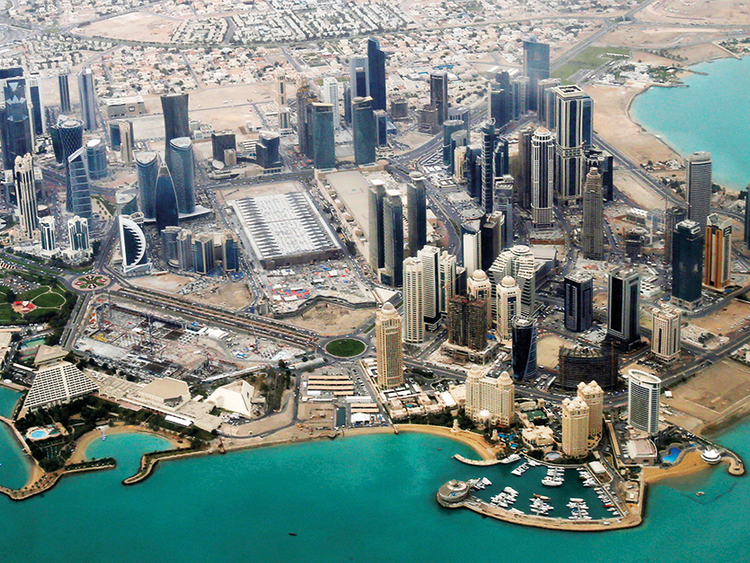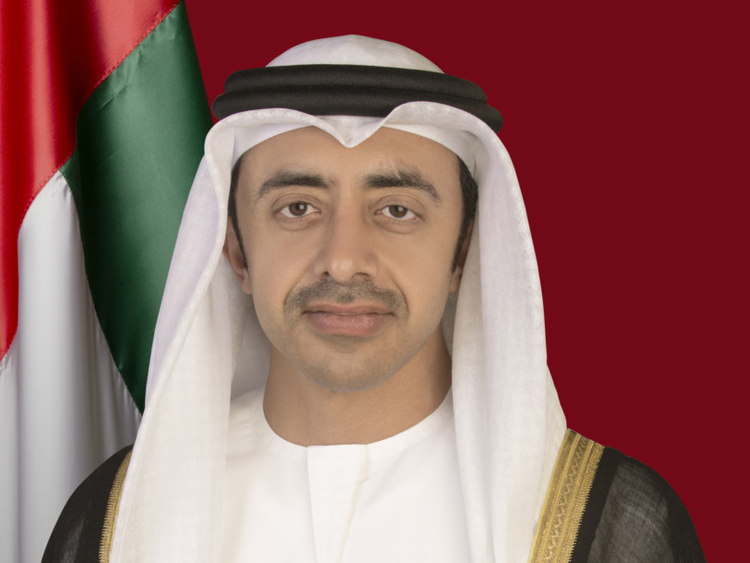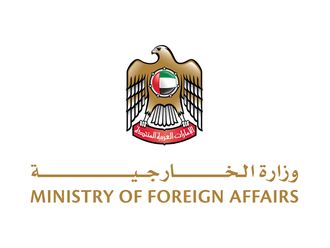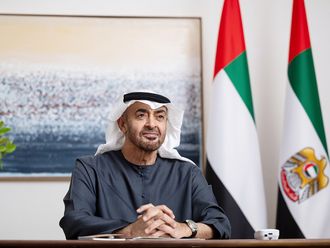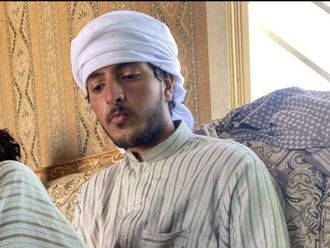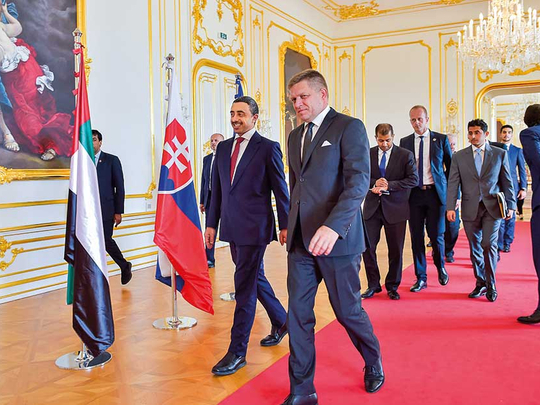
Bratislava, Slovakia: Shaikh Abdullah Bin Zayed Al Nahyan, Minister of Foreign Affairs and International Cooperation, has said that he welcomes Qatar’s recent signing of an anti-terrorism agreement with the United States, but expressed concern that the nation might not follow through with it.
In response to a question asked regarding the agreement that was signed between the State of Qatar and the United States on combating terrorism during a joint press conference held alongside Slovakian Foreign Minister Miroslav Lajcak on Wednesday, Shaikh Abdullah said: “The State of Qatar signed two agreements with the GCC countries, but it did not abide by them.”
“Qatar needs to do more to improve confidence in what it signs and what it actually implements,” he added.
He added: “We, of course, welcome Qatar’s signing of this agreement, but Qatar must also double its efforts to change the impression of many countries over its harbouring, supporting, and funding of terrorism, as well as for voicing extremist views, inciting violence and hatred,” he said.
“Our countries wish to achieve this, but only if Qatar is committed to changing this path,” he added.
“We in the region have decided not to allow any kind of tolerance towards extremist groups, terrorist groups and hate groups,” said Shaikh Abdullah.
READ MORE:
More revelations of Qatar’s plots in Libya
Al Jazeera: One broadcast, two different messages
Crisis: Qatar fails to grasp the reality
Qatar’s shrinking options from its rigid stance
Qatar-linked people, groups on terror list
Mohammad Bin Rashid poem urges Qatar to 'return to GCC'
“Our region has suffered enough, so when nations like Saudi Arabia and Egypt have decided to do that, we are optimistic,” he said, adding that, “If Qatar wants to be a member of this alliance then they are more than welcome but if Qatar wants to be on the other side, then as we say in Arabic, its time to say ‘good bye’.”
“We believe that there are two ways of dealing with things, whether to try and ease tension or try to address a problem,” Shaikh Abdullah explained in response to a question about what his expectations were from the meeting that US Secretary of State with the foreign ministers of the four countries.
“We do not believe that an attempt to ease the tension will address the matter, but will lead to delaying the problem, which will lead to a doubling of the situation in the future,” he said.
'Past mistakes'
“At the same time, we realise that there have been mistakes in the past from all of us — even the United States committed these mistakes, even Europe committed these mistakes — when we decided one day to support the so-called Mujahideen in Afghanistan and then the matter was not resolved and Afghanistan suffered a civil war.”
“The same thing happened in Somalia and Iraq, and today we see it happening in Syria and Libya, and I think if we start to blame, and blame certain issues, it will not end.
“The difference between our countries and Qatar is this: our countries are working with care and attention to confront and deter terrorism and extremism. It is true that our systems may not be the best possible under the situation, but the development of our systems, laws and structures significantly helps in countering these issues.
"However, the Qatari state is funding extremism, terrorism and fuelling hatred, which provides these terrorists with shelter and a platform.
“Of course we have to work better to counter extremism and terrorism and we need more allies and friends to face it,” he said.
“It is not fair to see that some countries want to fight and face extremism and terrorism, while others do not. What we are asking today from Qatar is what we ask of ourselves. We will not ask Qatar to take any action or steps we do not ask of, or commit to, ourselves as nations.”
'Curbing extremism, terror a long process'
He added, “Let us try to work together as the issue of extremism and terrorism is a long process and needs a real effort from all countries, including Europe, which unfortunately also allowed an environment that led to the growth of extremism and terrorism by not putting in place the appropriate laws and regulations to confront them, including the growing Yemeni extremist voices.”
Earlier in the day the UAE Foreign Minister had held a meeting with Slovakia’s Foreign Minister, Miroslav Lajcak, as part of his visit to Slovakia to review relations of cooperation between the two countries in various fields and means of enhancing them.
During the meeting, the two sides also exchanged views on latest regional and international developments, and the UAE Foreign Minister stressed the importance of consolidating mutual cooperation between the UAE and Slovakia.
The Slovak Foreign Minister welcomed Shaikh Abdullah’s visit, stressing his country’s keenness to strengthen its cooperation and friendly relations with the UAE, praising the leading position the UAE holds in both the regional and international arenas.
Political consultations
The meeting also saw the inking of a Memorandum of Understanding on political consultations between the two parties after which the two ministers then held the joint press conference.
After thanking his Slovakian counterpart and the Slovak Government for their efforts and interest in this visit, Shaikh Abdullah said, “This is the first visit since diplomatic relations between our two countries were established in 1993. We believe it is a very important opportunity to re-examine ways to develop and flourish this relationship.”
“There are more than US$300 million of inter-trade between our two countries and we believe that there are more opportunities to develop and even double this figure, especially following the signing of two important agreements, one for protecting and encouraging investment, and another on avoiding double taxation,” he said, before adding that he hopes to see the agreements gain legal approval from both sides as soon as possible.
“We are delighted to see that more than 30,000 Slovaks have visited the UAE and we look forward to providing similar opportunities for UAE tourists to Slovakia,” he added.
The UAE Foreign Minister also thanked Flydubai for its interest and commitment to providing direct flights between Bratislava and Dubai, saying “This has provided real opportunities for partnerships and improved the relationship between the peoples of the two countries.”
“The meeting was also an opportunity for us to exchange views on issues of common concern, both regionally and internationally,” he said.
Shaikh Abdullah went on to congratulate Lajcak for being selected as President of the United Nations General Assembly earlier this year.
“We believe it is a big responsibility, yet Slovakia has demonstrated its commitment to international issues. Through its presidency of the European Union last year, Slovakia has made clear its interest and ability to face these difficulties,” he explained.
Shaikh Abdullah said that there is a great opportunity to strengthen the relationship between the two countries, notably in the crucial fields of health and education, as “the UAE has a real desire to develop these sectors not only to provide services for its citizens and residents, but also in order to become a regional hub, attracting those who want to further develop their education or looking for advanced health services.”
“The European Union is an important partner for the UAE, and we have the desire to develop those relations even further and achieve a mutual free trade agreement,” he said.
He concluded the press conference by saying, “We believe that everyone has a great responsibility to work together to combat extremism and terrorism. I talk about extremism and terrorism together because we cannot fight terrorism if we do not fight extremism.”
The meeting was attended by Hamad Ali Al Kaabi, the UAE’s non-resident ambassador to Slovakia.


